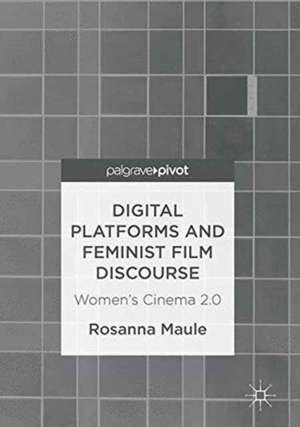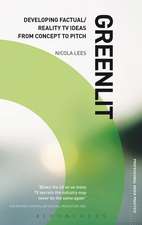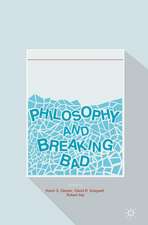Digital Platforms and Feminist Film Discourse: Women’s Cinema 2.0
Autor Rosanna Mauleen Limba Engleză Hardback – 22 sep 2017
| Toate formatele și edițiile | Preț | Express |
|---|---|---|
| Paperback (1) | 348.46 lei 38-44 zile | |
| Springer International Publishing – 10 aug 2018 | 348.46 lei 38-44 zile | |
| Hardback (1) | 420.79 lei 6-8 săpt. | |
| Springer International Publishing – 22 sep 2017 | 420.79 lei 6-8 săpt. |
Preț: 420.79 lei
Nou
Puncte Express: 631
Preț estimativ în valută:
80.54€ • 87.52$ • 67.70£
80.54€ • 87.52$ • 67.70£
Carte tipărită la comandă
Livrare economică 21 aprilie-05 mai
Preluare comenzi: 021 569.72.76
Specificații
ISBN-13: 9783319480411
ISBN-10: 3319480413
Pagini: 144
Ilustrații: XVII, 134 p. 7 illus. in color.
Dimensiuni: 148 x 210 x 14 mm
Greutate: 0.4 kg
Ediția:1st ed. 2016
Editura: Springer International Publishing
Colecția Palgrave Macmillan
Locul publicării:Cham, Switzerland
ISBN-10: 3319480413
Pagini: 144
Ilustrații: XVII, 134 p. 7 illus. in color.
Dimensiuni: 148 x 210 x 14 mm
Greutate: 0.4 kg
Ediția:1st ed. 2016
Editura: Springer International Publishing
Colecția Palgrave Macmillan
Locul publicării:Cham, Switzerland
Cuprins
1:Chapter One - New technologies of gender: Women and film in the digital era.- 2: Chapter 2 - Women make movies on the Web: digital platforms as alternative circuits.- 3. En-gendering the global market: Women’s cinema as a creative industry.- 4. Women and Online Porn in Canada: New Media, Old Debates.- Conclusions: Women Film Scholars Online.
Notă biografică
Rosanna Maule is Associate Professor of Film Studies in the Mel Hoppenheim School of Cinema at Concordia University, Canada. She is the author of Beyond Auteurism (2008), the main editor of In the Dark Room (2009), and with Guylaine Dionne she co-directed the feature documentary Women Filmmakers: The State of Things (2017). She is part of the research team GRAFICS at Université de Montréal, on the Board of Directors of the Women’s Film History International, and an active member of the Global Women’s Cinema Project.
Textul de pe ultima copertă
This project offers a critical overview of how online activities and platforms are becoming an important source for the production and promotion of women’s films. Inspired by a transnational feminist framework, Maule examines blogs, websites, online services and projects related to women’s filmmaking in an interrogation of the very meaning of women’s cinema at the complex intersection with digital technology and globalization. It discusses women’s cinema 2.0 as a resistant type of cinematic expression and brings attention to the difficulties inherent in raising and expanding visibility for women’s filmic expression within a global sphere dominated by neo-liberalism and post-feminism. The author pays close attention to the challenges and contradictions involved in bringing a niche area of filmmaking and feminist discourse to the broad and diverse communities of the Internet and global media market, while also highlighting the changing forms of media and feminism.
Rosanna Maule is professor of Film Studies in the Mel Hoppenheim School of Cinema at Concordia University, Montreal. She specializes in contemporary film authorship, European contemporary cinema, and feminist approaches to film and media studies. She is the author of Beyond Auteurism (2008), main editor of In the Dark Room (2009) and has edited several book chapters and film journal articles on topics related to her areas of expertise. She is part of the research team GRAFICS at Université de Montréal, on the Board of Directors of the Women’s Film History International and an active member of the Doing Women’s Film History Network and the Global Women's Cinema Project. With her colleague Guylaine Dionne, she is completing a feature documentary on the role and visibility of female film directors working in fiction filmmaking around the world.
Caracteristici
Seeks to interrogate the very meaning of women’s cinema at the complex intersection of digital technology and globalization Draws on transnational feminism and cyberfeminism Addresses issues of entrepreneurship, post-feminist neoliberalism, and cultural identity in the new sociocultural relations that women involved in film establish through techno-mediated environments




